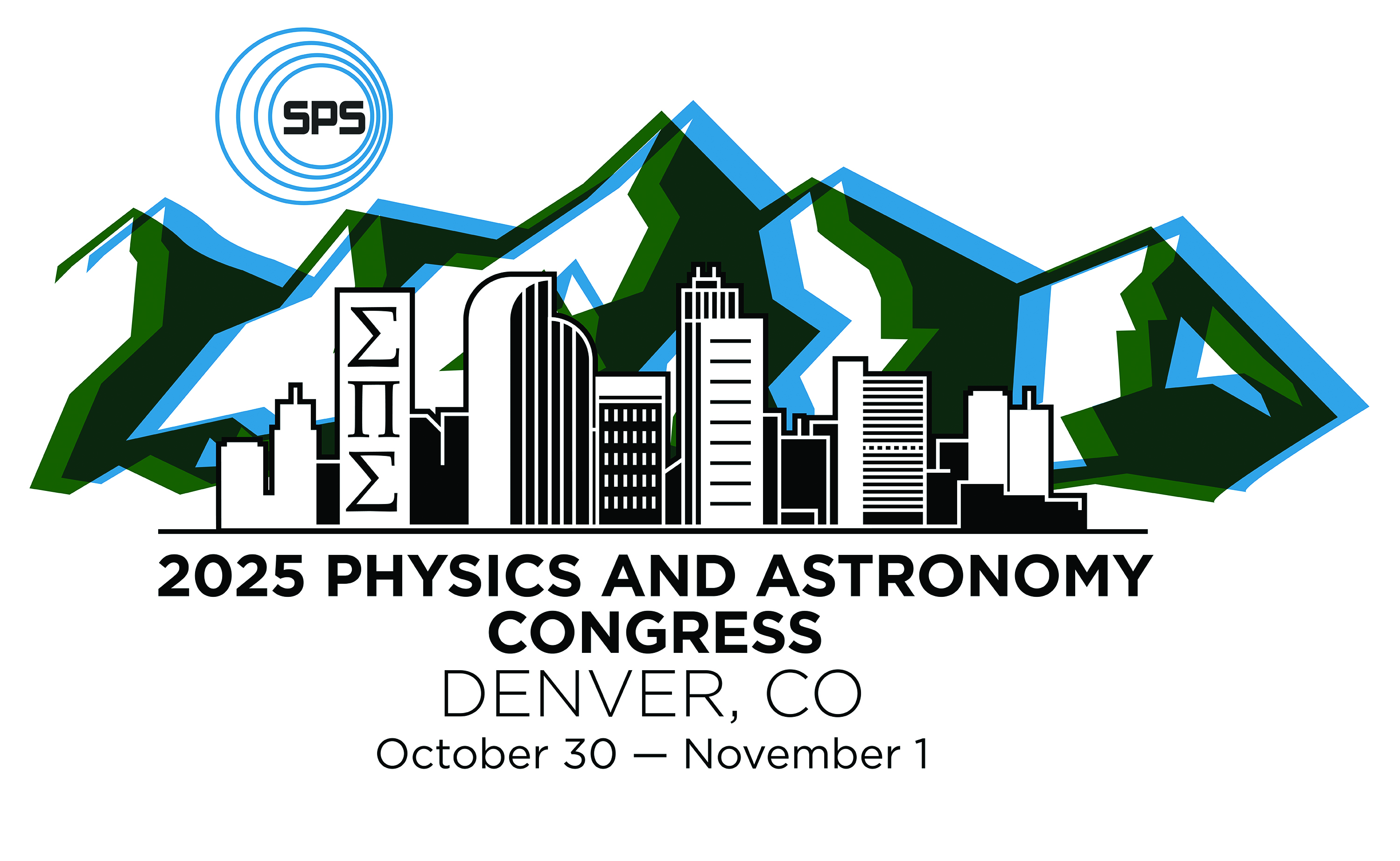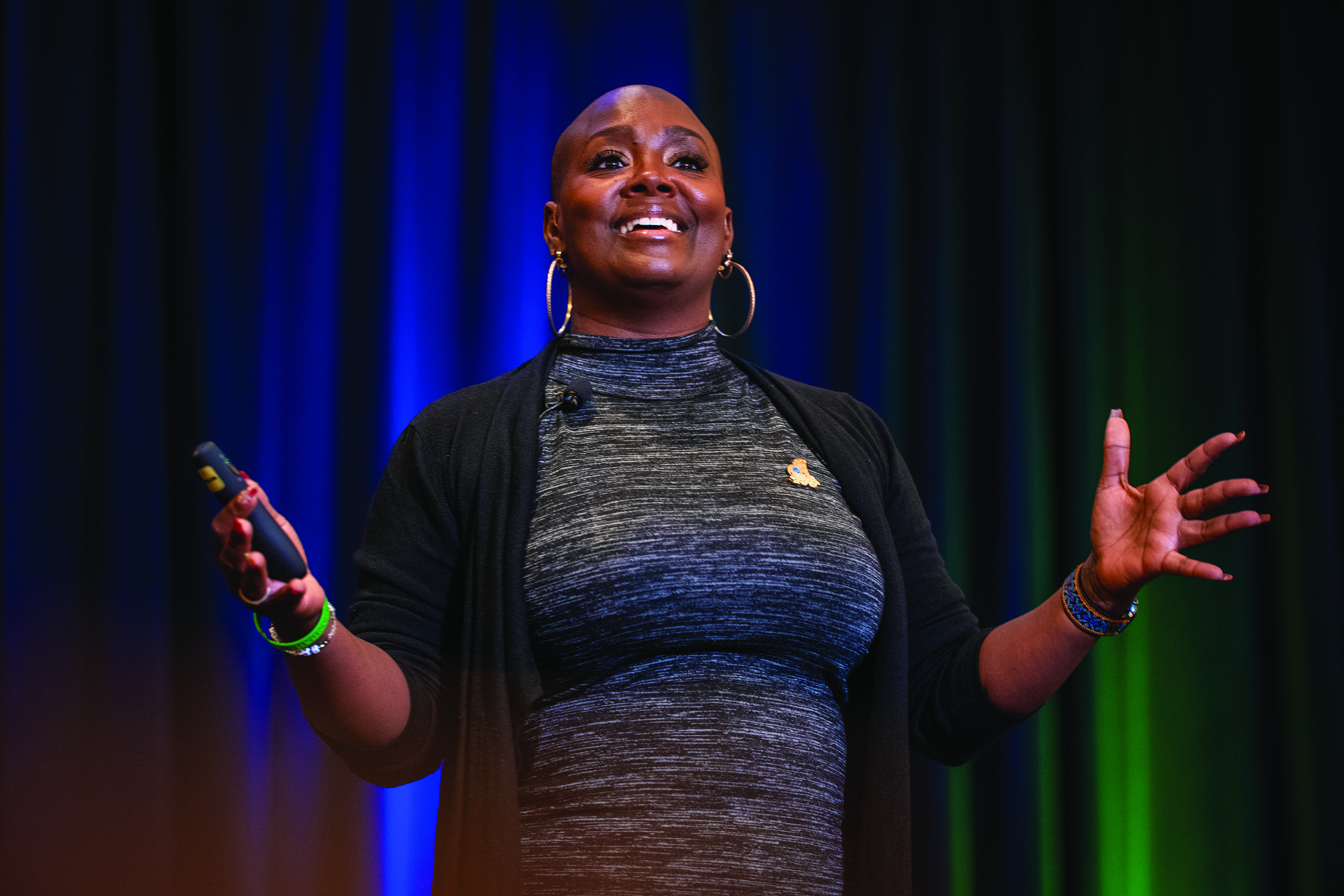Words of Wisdom for Physics and Astronomy Majors A Q&A with K. Renee Horton, plenary speaker at the 2022 Physics Congress
Fall
2023
Feature
Words of Wisdom for Physics and Astronomy Majors A Q&A with K. Renee Horton, plenary speaker at the 2022 Physics Congress
Kayla Dickert, Julia Oseka, Joe Popp, Dan Fauni, and Nate O., SPS Reporters, Saint Joseph’s University
Renee Horton is a space launch system (SLS) quality engineer in the NASA Residential Management Office at the Michoud Assembly Facility. She runs Unapologetically Being, a nonprofit organization that mentors cohorts of students, writes children’s books, and gives invited talks on topics from NASA’s Space Launch System to overcoming disabilities.
Why did you choose to major in electrical engineering, and why did you transition from that into a PhD in materials science?
When I was younger, I remember telling my dad I wanted to be a scientist―my grandmother made me a lab coat to play with. When I told my dad what field I wanted to enter, he said, “I don't know any Black scientists; you should do engineering.” So I did engineering.
After I graduated, I started pursuing a master's in electrical engineering. I had a professor who spoke English as a second language.
I couldn't understand him―my brain was processing everything like I was hearing Charlie Brown’s teacher: “Womp womp womp.” And the professor said to me, “You are by far the dumbest student I have ever met.” Right there, in that moment, I was thinking, “I kind of am.”
I have hearing loss in the speech range. After this interaction,
I learned that because of my hearing loss, my brain has trouble figuring out the words of someone who doesn't speak English as a first language. It has to do with the accent. I thought about dropping out.
Then I went to a National Society of Black Physicists (NSBP) meeting. When I walked in, there was a room full of people who looked like me and who were smart. And I knew I was smart, too. One of my engineering professors had said I should consider getting a PhD because I wanted to know too much. Well, I ended up writing a NASA grant, got it, and then switched over to a physics PhD program.
A good portion of your work now is in management. Would you recommend that undergraduate physics students take electives in business? Would that be useful in industry or academia?
That really depends on where you want to focus. I recommend that everyone take a speech class to get over the fear of speaking in public and learn how to communicate science. I’ve heard that scientists should communicate science in ways that a third-grader can understand.
If you want to be in management, you should take leadership courses. Managing people can be different than managing a project—to manage people you've got to have soft skills.
When doing science outreach, how should we engage with primary school students?
When kids get something wrong, don’t point out that they’re wrong. Say, “Oh my God, that was great―but what if you think about it like this?” As soon as you tell them they’re wrong, they start thinking, “Oh, I can't do this.” If you are excited, they'll be excited. And don’t go overdressed—you want to be as comfortable as possible so they can identify with you.
You speak a lot about imposter syndrome and feeling like you don't belong in a space. How do you deal with those kinds of feelings and move past them?
Plenty of times we walk into spaces and because we’re the odd man out, we feel uncomfortable. But if that's truly where you want to be, get comfortable with being uncomfortable.
What do you do when you feel like everything is against you? Like everything is trying to stop you?
Stop and reboot. Think about a battery—when it's drained, you either recharge it or throw it out. That's what we are. And since we’re not going to throw you out, you gotta recharge. You gotta define those things that actually recharge you. If sitting in silence recharges you, then do it. Shut everything down for 15 minutes or put on calming music, if that's what does it for you. But you've got to learn to recharge. If that means sleeping in on a Saturday, do it.
How would you recommend early career physicists start creating a network?
Walk up to somebody and start a conversation. That's it. You can literally walk up to people at a conference and say, “Hey, what kind of research are you doing? What kind of research are you interested in?” Then they'll tell you, and you either are or aren't interested in what they're doing. You might find someone familiar with what you want to do. And someone might say, “You know what, I know a professor who does that.”
You have many accomplishments and you've overcome a lot of obstacles in your life. How do you find the motivation and determination to pursue more success and not just rest on your laurels?
I'm a spiritually grounded person, and I believe that when you ask the universe or God to give you something, then you’re responsible for it as well. I asked to be able to make an impact, and he's given me opportunities to do that. I truly, honestly believe that I owe it to the universe.
This interview has been edited for length and clarity.
Read more about Renee Horton in the Fall 2021 issue of the SPS Observer at spsnational.org/the-sps-observer/fall/2021/going-full-circle.
8-feature-physcon2-logo.jpg

Hosted by Sigma Pi Sigma, the next Physics and Astronomy Congress will be October 30–November 1, 2025, in Denver, Colorado.
Keep an eye on the SPS website for details, sigmapisigma.org/sigmapisigma/congress/2025.

